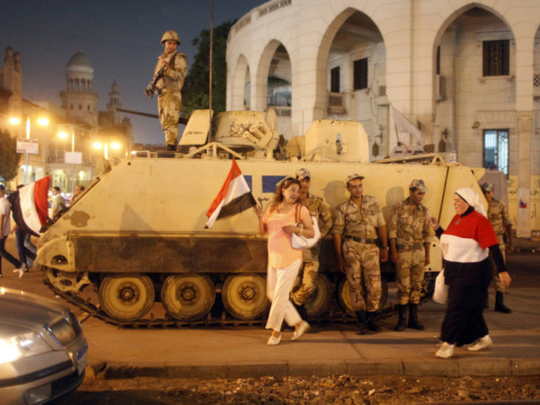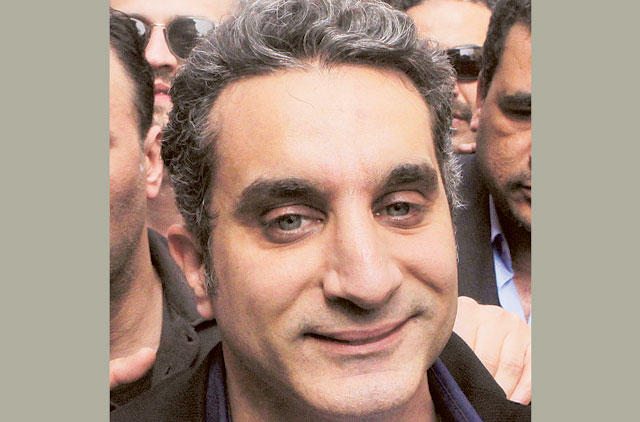
Cairo: The voices warning about the perils of the national reverence for the Egyptian military that’s been held by secular-leaning activists since the ouster of President Mohammad Mursi on July 3 are few, and subject to threats and allegations that they’re stooges for “terrorists” from former friends and allies.
But they include a number of prominent Egyptians who have fought harder than most for free speech and individual rights in the country – people who have taken principled stands against the failings of the Muslim Brotherhood, the former regime of Hosni Mubarak, and Egypt’s tradition of impunity for human rights abuses committed by soldiers and policemen.
Earlier this week Bassem Yousuf, Egypt’s answer to Jon Stewart, became perhaps the most prominent Egyptian to express alarm about the climate that has emerged since June 30, the day that mass protests against Mursi began, which convinced the military to depose him on July 3.
Self-professed liberals are demonising the Muslim Brothers as agents of foreign powers, cheering for the military to drive the mass movement from the country’s politics, and turning on anyone who dares suggest that Egypt’s generals don’t have a track record as friends of democracy.
“Kudos to those who have not allowed the victory high to rob them of their humanity; to those few who are currently isolated by everyone else and are not welcome in either camp unless they go with the current flow of hatred and gloating,” the TV comedian said in an article published in Arabic by the Al Shoruk newspaper on Tuesday, and in English by the website Tahrir Squared on Wednesday. “What’s that?” Yousuf imagined a typical conversation in Egypt today, “Some MB members died at the Republican Guard? And why were they there in the first place? Aren’t you glad this happened to them? Why aren’t you gloating? You must be a Brotherhood supporter! You must be an enemy of the military and the state and probably work as a part-time terrorist!”
Wael Abbas, a journalist and human rights activist who made a name for himself in the final years of the Mubarak regime for exposing police torture and other abuses and was briefly arrested by the army during the uprising against Mubarak in 2011, is another who is speaking out.
“They call us traitors now, henchmen for the Muslim Brotherhood and the US,” says Abbas. Like Yousuf, Abbas is among the few Egyptians who are troubled both by the Muslim Brotherhood’s actions while in power and the demonisation of the group since Mursi was ousted.
“Of course, this is not a revolution,” fumes Abbas. “In a revolution, you should expect bullets from the army and the police, not flags and sweets. What happened on June 30 was a celebration of something that had been decided long beforehand, or it would never have been allowed to happen.”
Questioning those events is a courageous act in an Egypt that is riding a wave of military idolisation after it deposed Mursi.
Even the Revolutionary Socialist party supports the coup that booted him from office and Mursi’s supporters are routinely referred to as “terrorists” on TV, including on CBC, the privately owned channel that airs Yousuf’s weekly show, El Bernameg. Neither Yousuf nor Abbas are friends of Mursi.
Yousuf relentlessly ridiculed him during his year in power and went to court on charges of insulting the president and religion. But he’s also not fond of military political supremacy, which is as threatening to his liberal political values as is rule by the Muslim Brotherhood.
In the early days after Mursi’s ouster, Yousuf appeared supportive, imagining in a July 9 column an ugly alternative universe in which Mursi retained power and began a sweeping crackdown on political dissent.
But the killing of at least 51 Mursi supporters outside the Republican Guards barracks on July 8, the jailing of Muslim Brotherhood leaders, the silencing of the Islamist media, and the vindictiveness of parts of the public and the media, have him concerned.
“The fascist nature of those people is no different than that of the Islamists who think that their enemies’ disappearance off this planet would be a victory for the religion of God,” he wrote on July 16.
“But those on this ‘victory high’ consider themselves to be different; they justify their fascism for the ‘good of the country’... We are now repeating the Brotherhood’s same mistakes. It’s as though we have the memory span of a goldfish.”













